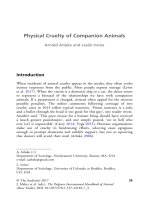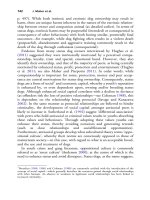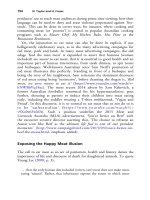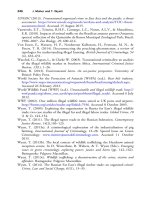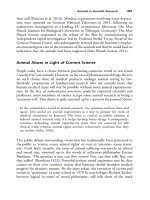The palgrave international handbook of a 106
Bạn đang xem bản rút gọn của tài liệu. Xem và tải ngay bản đầy đủ của tài liệu tại đây (37.32 KB, 1 trang )
96
A. Nurse
variance in (US) state laws on neglect, although failure to provide for an
animal’s basic needs constitute a common definition that can be arrived at by
analysing state law. McMillan (2009, p. 75) identifies that ‘of the cruelty
statutes of the fifty United States and the District of Columbia, none include
language specifically acknowledging or addressing emotional neglect, abuse,
or suffering in their definition of cruelty’. Thus a definition of cruelty
arguably exists in US law which sees abuse (including neglect) as solely
being physical, active and direct harm inflicted on non-human animals.
Yet, other jurisdictions have begun to recognise emotional distress, including
that caused by neglect, as being integral factors in non-human animal abuse.
The UK Animal Welfare Act 2006, for example, goes further by requiring a
positive approach to animal welfare enshrined as a duty to provide a good
standard of animal welfare, as illustrated by the following case study:
Case Study: The Animal Welfare Act 2006
and Neglect as Abuse
The Animal Welfare Act 2006 received Royal Assent on 8 November 2006
and became law in March 2007 in Wales and April 2007 in England making
owners and keepers responsible for ensuring that the welfare needs of their
non-human companions are met. Thus, a person who is cruel to an animal,
or does not provide for its welfare needs, may be banned from owning or
keeping animals, fined up to £20,000 and/or sent to prison. The government
department, DEFRA, responsible for both animal welfare and wildlife crime
has subsequently (2010) introduced Codes of Practice for the welfare of: cats
(2009a); horses and other equidae (2009b); dogs (2009c); and privately kept
non-human primates (January 2010). Contained within the legislation and
the associated codes is the principle of recognising animals as sentient beings
with individual needs. Thus, ‘standard’ approaches to companion welfare are
no longer acceptable (Nurse and Ryland 2014, p. 6). The Animal Welfare
Act 2006 consolidates much earlier legislation and both promotes animal
welfare and provides an enforcement mechanism through which punishment
may be pursued, by way of criminal sanctions, where there is a breach of
animal welfare standards and the legally enforceable duty towards animals.
By imposing this duty, the UK Animal Welfare Acts create the requirement
for a ‘responsible person’ to ensure that a companion’s needs are met. The
duty of care is not solely one imposed on an animal’s ‘owner’, recognising
that ownership might be a contested concept, but also encompasses those for
whom it might be possible to demonstrate legal ownership (i.e. through
